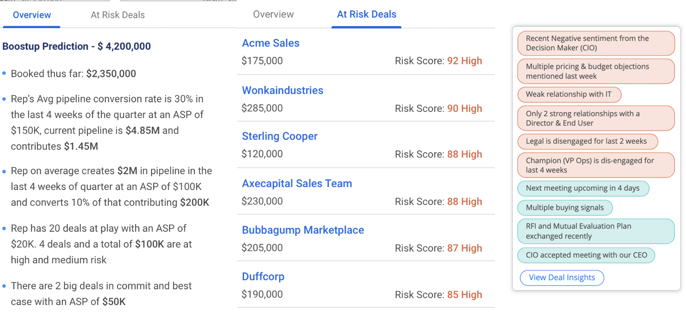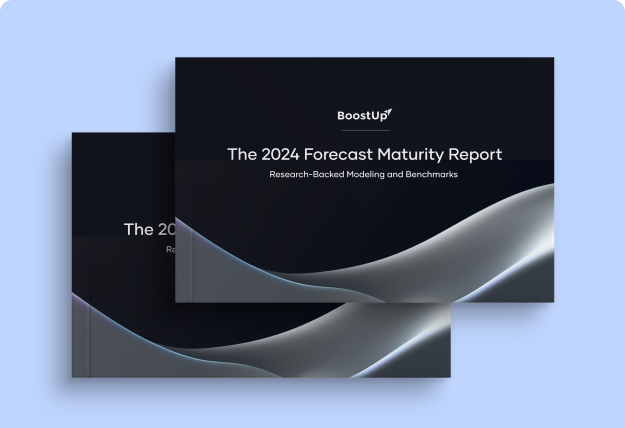The Revenue Blog /
BoostUp vs. Salesforce Einstein: Not all sales AI is created equal.
BoostUp vs. Salesforce Einstein: Not all sales AI is created equal.

Topics covered in this article
Not all sales AI is equal. Salesforce Einstein for sales analytics and sales AI is largely a time-series analysis based on AI predictions. Salesforce Einstein’s time-series based sales AI works when your organization has:
- Years worth of selling data,
- Similar sales cycles and deal sizes across the team,
- Stable sales process across years,
- And a strong and consistent sales team with good quota history.
Now for most B2B organizations, this is not even remotely their state. Most sales organizations are in a perpetual state of change, including new products, new reps, new sales processes, new markets, new pricing, new territories – and the list goes on and on. These changes make it hard to train time-series historical AI models and seriously limit Salesforce Einstein Analytics time-series algorithms’ accuracy and effectiveness.
In artificial intelligence, your output is only as good as the quality of input training data. That’s why Salesforce Einstein can be un-actionable at best and inaccurate at worst. Compare Salesforce Einstein to a deal-by-deal bottoms up contextual AI.
What is Contextual AI?
Contextual AI does not depend on historical information as a primary lever. Yes, historical information is valuable if you have it, and it’s consistent, but contextual AI takes into account current deal conditions. These conditionals includes information such as:
- What topics have been discussed so far in the deal?
- Is the champion engaged?
- Is the next meeting on the calendar?
- Are senior titles engaging with the rep?
- When did the rep last touch the deal?
- Has the prospect responded to the ROI calculator yet?
On the other hand, Salesforce Einstein’s time series AI bases its analysis on averages and solely historical information. Example of information includes:
- How many deals that the company close on average per quarter?
- What’s the average deal size?
- What’s the average pipeline and such?
Enter BoostUp's hybrid approach to sales AI.
BoostUp recommends utilizing time-series AI combined with contextual AI to deliver the most accurate forecasting projections and deal insights. This hybrid approach has the following advantages over Salesforce Einstein AI:
- Accurate Forecasts: More context delivers much more accurate and reliable forecasts. Easily land within 5% of your forecast projections.
- Actionable Insights: Insights based on context allow sales managers to identify early warning signs that increase opportunity win-rate and lowers slip-rate.
- Enhanced Coaching: Deal insights based on the context and sentiment of all engagement, and more importantly, the lack of engagement) creates signals for managers to coach more effectively and improve forecasting.
BoostUp hybrid approach to sales AI leads to better forecast predictions, improved intelligence, and more actionable and reliable predictions, inherently improving your ability to drive more predictive revenue and more confidence and accuracy in your forecast.

BoostUp, built first as a data and intelligence platform, is the most complete and only all-in-one revenue intelligence platform available. Building our platform in this way has allowed us to create this hybrid approach to analytics that goes beyond historical data and inputs. BoostUp applies real-time learning on new activities and inputs, makes predictions, and provides actionable insights to the entire revenue team, from sales manager and reps to RevOps and Customer Success team, to better understand and recommend actions take place.
In the next blog, we will consider two scenarios and put Salesforce Einstein to the test.
To learn more about BoostUp’s all-in-one revenue operations and revenue intelligence platform, contact us to set up a time to discuss further.




-Photoroom.png)